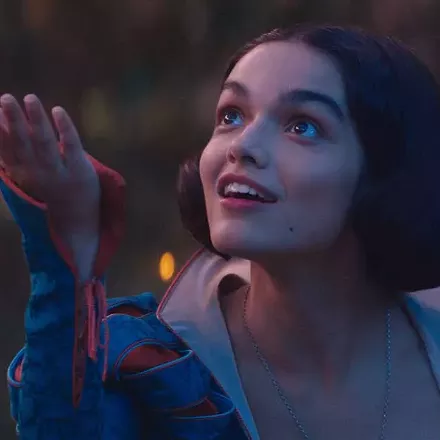Feature movie review: WE GROWN NOW
Period-piece drama finds quiet power in how hard it is to keep kids safe
By Scott Renshaw @scottrenshawThe bleakness and violence in the setting of writer/director Minhal Baig's We Grown Now—the Cabrini Green housing projects of Chicago circa 1992—makes its way onto the screen in indirect ways. When a grade-school student is accidentally killed in a drug-related shooting, the incident occurs off-screen; even the film's main character, the victim's young schoolmate Malik (Blake Cameron James), deliberately chooses not to view the child's body at his memorial service. What we see instead are the consequences in that event's aftermath: random police searches of the project's apartments; parents forced to decide if they can stay; kids who fall into a state of despair far beyond their years.
It's understandable if some viewers might consider We Grown Now a sanitized version of the time and place it portrays, choosing not to get its hands dirty with actual bloodshed. Yet it feels like there's a different goal in mind here, one that does not require the bleaker, grittier vibe of other narratives set in similar milieus. Baig's visual storytelling is really about a certain idea of childhood, and how desperately parents try to keep their children protected from some of the uglier aspects of life. This is an often-lyrical child's-eye-view tale that recognizes the tension in its own title, where boys not yet old enough to shave don't always have the luxury of enjoying their childhood.
That simple bliss seems possible at the outset, as Malik and his best friend Eric (Gian Knight Ramirez) drag a mattress from an abandoned apartment to go diving onto it. They're still at a point where they can find enjoyment in silly dad-joke riddles, but that aforementioned instance of violence creates immediate tensions throughout the projects. And it forces Malik's mother Dolores (Jurnee Smollett) and his grandmother Anita (S. Epatha Merkeson) to begin thinking about whether their best option is to move away.
That notion of moving to a better life provides a thematic undercurrent throughout We Grown Now, as Baig spends time on Anita reminiscing about leaving Jim Crow-era Mississippi for the better opportunities promised by the North, Malik's own recurring dreams of trains and his fascination with Walter Ellison's "Train Station" painting at the Chicago Art Institute. There's a melancholy tone to the way Baig approaches this constant striving, and the recognition that being Black in America means always hoping that the next stop will be the one that ends the sense of being perpetually at risk.
It's easy to take the time to consider these ideas in We Grown Now because Baig's visual filmmaking proves so patient and confident. Yes, there are scenes of upheaval and agitation, like the middle-of-the-night visit by the housing authority police that turns Malik's family apartment upside-down. But more often, Baig finds compositions that are hauntingly lovely in a more restrained way, like framing Malik and Dolores in their respective bedroom doorways, sharing a space but separated by the weight of responsibility felt by an anxious mother. Even the sound design creates tension out of subtlety, as the drip of a faucet in Malik's apartment provides a rhythmic reminder of problems that are known about, but left unfixed.
We Grown Now spends less time on Eric and his life with his widowed father (Lil Rel Howrey), which becomes a bit of an impediment when we understand how Eric has already begun to sink into nihilism and atheism, sensing no hope for their circumstances. It would have helped to get a better sense for the differing attitudes that begin to create a rift between the two friends, and why their shouts of "We exist!" from the projects' hallways might come from different places. But the film as a whole is haunting in a somewhat unexpected way—not because it forces you to stare at the frightening reality of these kids' lives, but because it understands the reality of trying to keep that frightening reality away from them. "I can't keep you safe," Dolores laments to Malik at one point, and We Grown Now finds its quiet power in wondering why it should be so hard to do so.
More by Scott Renshaw
-
Film Reviews: New Releases for March 28
A Working Man, The Woman in the Yard, The Penguin Lessons, Death of a Unicorn, Audrey's Children
- Mar 27, 2025
-
Film reviews: THE PENGUIN LESSONS, DEATH OF A UNICORN
Fumbling the potential-filled question of what to do when confronted with a broken system
- Mar 26, 2025
-
Theater preview: Plan-B Theatre Company's The Beatrix Potter Defense Society
Local playwright Janine Sobeck Knighton explores how isolation inspired the beloved author.
- Mar 26, 2025
- More »
Latest in Film Reviews
Readers also liked…
-
Sundance 2025 wrap-up plus February special screenings
Uncertainty about the future location shifts focus away from the movies
- Feb 5, 2025










